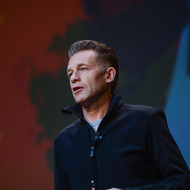
Chris Packham pays tribute to the human-animal bond
TV presenter and naturalist Chris Packham gave an impassioned keynote speech on the importance of companion animals and the role vets play in protecting the bond of friendship between people and pets.
Delivering this year's BSAVA Congress lecture he said that in the UK we spend more each year on grooming our dogs than on particle physics research. But he asked: "Can you put a price on a companion animal? Can you put a price on hearts being connected by a thread? I don't think so.
"We can have particle physics, but I think we need companion animals, and if we need companion animals then we need people to look after them, because they are precious."
Citing a number of studies highlighting the positive impact dogs have on the health and wellbeing of adults and children, including families with autistic children, he paid tribute to the "constancy and infallible trust" we get from dogs. By contrast, relationships with humans are "a lot more costly" in terms of risk, as they tend to generate expectations, leading to disappointment.
Mr Packham went on to describe his own relationship with his dogs and the emotional journeys he has been on as the client of a veterinary practice.
"I consider myself part of my dog… When humans come to your surgeries with their pets they are part of those pets. You're not just treating the dog, you're treating the humans too because of that thread. And that is something that I think needs to be kept at the forefront of veterinary practice."
He stressed the importance of communicating effectively with clients who are "desperate to know what you know", taking the time to discuss their pet's condition and treatment options in more detail, utilising tools such as hand-drawn diagrams and models, talking through scans or offering links to resources for further information.
Concluding, he said: "The key thing is, we come to you to keep our loved ones alive and some of us love those animals as much, if not more, than they love their family.
"Some of us come to you to keep those loved ones alive and we don't have any friends; they are our friends. Some of us are in a bubble where the rest of the world is only tolerable when we're safe inside it. Some of us are connected to those animals by a thread that runs between our hearts. Please look after us."
Image by Steve Burden



 The Veterinary Medicines Directorate (VMD) is inviting applications from veterinary students to attend a one-week extramural studies (EMS) placement in July 2026.
The Veterinary Medicines Directorate (VMD) is inviting applications from veterinary students to attend a one-week extramural studies (EMS) placement in July 2026.